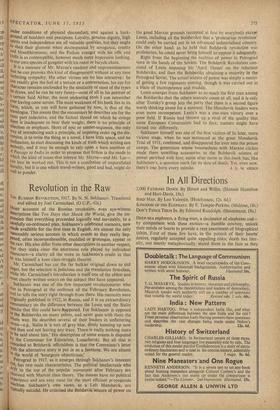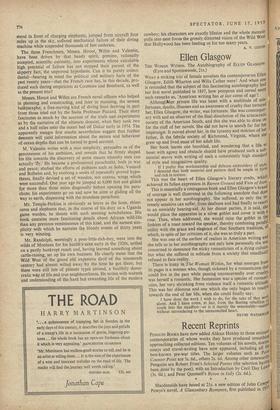In All Directions
BIRD MAN. By Leo Valentin. (Hutchinson, 12s. 6d.) DEEP-SEA explorers, a flying man, a decimator of elephants and— by comparison with these exotics—a humble cowboy, unlock their minds or hearts to provide a rare assortment of biographical titbits. Four of these five have, in the pursuit of their hearts' desires, regularly accepted quite appalling risks; death has liter- ally, not merely metaphorically, stared them in the face as they
stood in front of charging elephants, jumped from aircraft four miles up in the sky, suffered mechanical failure of their diving machine while suspended thousands of feet undersea.
The three Frenchmen, Messrs. Houot, Willm and Valentin, have been driven by that heady spirit, genuine, rationally accepted, scientific curiosity, into experiments whose calculable • high potential of failure has not stopped their pursuit of the slippery fact, the unproved hypothesis. Can it be purely coinci- dental—bearing in mind the political and military facts of the past twenty years—that the French race has, in this decade, pro- duced such daring empiricists as Cousteau and Bombard, as well as the present trio?
Messrs. Houot and Wil1m are French naval officers who helped in planning and constructing, and later in manning, the newest bathyscaphe; a free-moving kind of diving boat deriving in part from those tried out by the Swiss Professor Piccard. Their story
' fascinates as much by the account of the trials and experiments as by the narrative of the ultimate descent, when they sank two and a half miles onto the ocean bed off Dakar early in 1954. The apparently meagre first results nevertheless suggest that further descents will yield information about the nature and behaviour of ocean depths that can be turned to good account.
M. Valentin writes with a nice simplicity, persuades us of the genuineness of his ambition, and reveals that he firmly shaped his life towards the discovery of some means whereby men can actually 'fly.' He became a professional parachutist,' both in war and peace; studied the efforts of pioneers such as Sohn, Vassard and Bolhelm and, by evolving a series of repeatedly proved hypo- theses, finally devised a set of wooden, not canvas, wings which were successful. One year ago he jumped at 9,000 feet and glided for more than three miles diagonally before opening his para- chute; his experiments go on and now he aims at gliding all the way to earth, dispensing with the mundane parachute.
Mr. Temple-Perkins is obviously as brave as the lions, rhino- ceros and elephants that, in the course of his duty as a Uganda game warden, he shoots with such seeming nonchalance. His book contains more fascinating details about African wild-life than any previous reminiscence of this kind, and the earnest sim- plicity with which he narrates the bloody events of thirty years is very winning.
Mr. Randolph, seemingly a poor-little-rich-boy, went into the wilds of Montana for his health's sake early in the 1920s, settled on a partly bankrupt ranch and, having learned something about cattle-raising, set up his own business. He clearly states that the Wild West of the grand old expansive days of the nineteenth century had almost wilted away by the time he got there; but there were still lots of pioneer types around, a healthily demo- cratic wIty of life and true neighbourliness. He writes with warmth and understanding of the hard but rewarding life of the modern cowboy; his characters are exactly lifesize and the whole memoir pulls into neat focus the grossly distorted vision of the Wild West that Hollywood has been feeding us for too many years. A. V. COTON



































 Previous page
Previous page